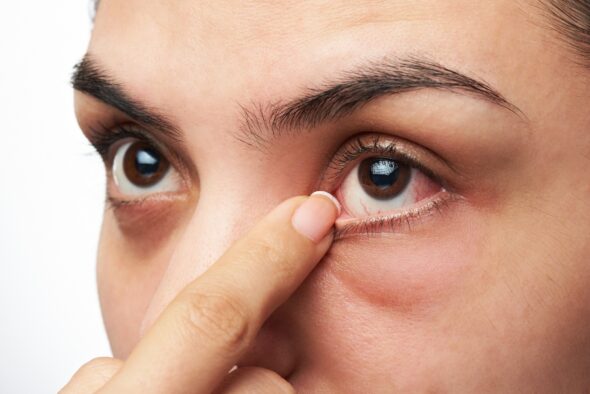
Managing Dry Eye Syndrome This Winter
Posted November 23, 2020Dry eye syndrome is the most common complaint eye doctors receive. It affects between 5 to 30 percent of those 50 and up. While some who experience dry eye syndrome only notice symptoms at certain times, others are plagued constantly. But whether you have seasonal or chronic dry eye syndrome, talk to your doctor immediately to learn of your risks and treatment options. Keep reading to learn how to manage your symptoms this winter.
What is CDE?
Chronic dry eye syndrome, or CDE, occurs when there is insufficient tear production or poor tear quality. Your tears are necessary for lubrication and for flushing out irritants and bacteria. The eye is exposed to numerous harmful substances and tears act as a barrier.
Composed of water, mucus, fatty oils, and over 1,500 different proteins, the composition of your tears is essential to the health and wellbeing of your eyes.
Symptoms
Symptoms vary widely from person to person and also depend on the underlying cause of your dry eyes. Other factors include differing seasons, the time of day, environmental toxins, allergens, and computer, phone, or tablet time. COVID has highly impacted several of these factors, from the amount of time we spend in our houses to the hours we are in front of our laptops. The usual symptoms of dry eye syndrome include:
- Itching
- Burning or aching
- Redness
- Weeping and tearing
- Stringy or weeping mucus
- Sensitivity to light
- Blurred vision
- Heavy eyelids
- Eye fatigue
- Difficulty driving at night or wearing contacts
Causes and Risks
If you notice any of the above symptoms, especially in conjugation with others, contact your doctor. Never overlook these symptoms as they can be indicators of serious underlying conditions and can lead to a number of risks.
Dry eye syndrome can be caused by a wide variety of conditions, such as:
- Thyroid disorders
- Vitamin A deficiencies
- Diabetes
- Allergies
As well as over-the-counter or prescribed medications, such as:
- Antidepressants
- Antihistamines
- Decongestants
- Birth control
Your risk of developing dry eye syndrome increases with age and women are at a higher risk than men. Without adequate tear protection, the eye is exposed to dangers such as a scratched cornea, corneal ulcers, and eye infections. Smoking and prolonged screen time also increases your risk of compromising your eye health and vision.
Treatment
Diagnosing CDE can be difficult since there are so many symptom combinations. Your eye doctor will start with an eye exam and comprehensive health history, so bring a list of your medications and dosages. This will all help your doctor assess your situation and possible treatments.
Conventional choices include:
- Eye drops
- Medications to spur tear production
- Surgery
- Changing medications that are causing your discomfort
- Treating underlying conditions
- Antibiotics for inflammation
- Special contact lenses or eye inserts
Natural options:
- Limiting screen time
- Washing and massaging eyelids
- Coconut oil both on and in your eye for inflammation
- Boosting vitamin A
- Taking omega-3 and fish oil supplements
- Acupuncture
Extra Winter Precautions
Dry eye syndrome is often worse during the fall and winter months because of the cooling, dry air. Windy, dry, and arid environments increase sensitivity and further dry out your eyes, all while fall and winter allergies increase. There are several precautions that can be taken so that this winter will be an enjoyable experience.
- Because we are all spending more time inside and aren’t opening windows as often, consider a humidifier with relaxing essential oils.
- Remember that UV damage is as much of a problem during winter months as summer. Wear sunglasses for protection against those damaging rays. They can also be helpful when it is windy or you are working outside with leaves, dust, and dirt.
- The days are shortening and that means more driving at night. This can cause eyestrain, so consider anti-glare glasses or prescription lenses.
- Practice good hygiene and keep healthy so that you won’t have to use as many decongestants and cold medications. These can make your dry eye symptoms much worse.
Chronic dry eye syndrome is a common condition that affects millions of people every year. If you think you may have CDE, talk to your doctor right away. A diagnosis will help you understand if it’s just allergies or a serious condition that needs treatment. Ask about your options and practice some of the practical tips this winter. Our team is here for you at either of our Christiansburg or Salem locations and we want you to have a wonderful winter this year.
